Fix 'Windows Cannot Be Installed to This Disk MBR'
PAGE CONTENT:
- Overview of 'Windows Cannot Be Installed to This Disk MBR'
- How to Fix 'Windows Cannot Be Installed to This Disk MBR'
- Cause of 'The Selected Disk Has an MBR Partition Table'
The solutions on this page can help fix the error "Windows cannot be installed to this disk MBR" in Windows 11/10/8/7. If you're experiencing this issue, you can try the provided solutions to resolve it on your own.
Overview of 'Windows Cannot Be Installed to This Disk MBR'
The error "Windows cannot be installed to this disk MBR" occurs during Windows installation, indicating the selected disk has an MBR partition style, preventing successful installation. This issue can also manifest as "Windows cannot be installed to this disk. The selected disk is of the GPT partition table." To resolve these errors, you can try converting the disk to GPT, using a different installation media, or reinstalling Windows on a different disk. These errors typically occur due to the disk's partition style being incompatible with the Windows installation process.
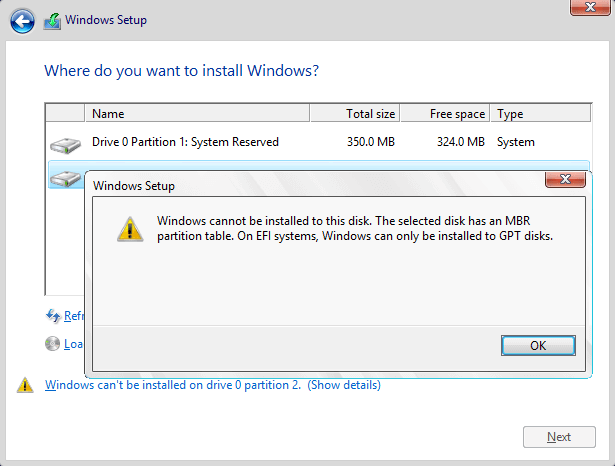
How to Fix 'Windows Cannot Be Installed to This Disk MBR'
If you encounter the error message "Windows cannot be installed to this disk," the solution is straightforward: simply convert the Master Boot Record (MBR) to a GUID Partition Table (GPT) disk. This can be achieved through three different methods, providing users with flexibility and convenience.
- Method 1. Convert MBR to GPT without Data Loss
- Method 2. Convert MBR to GPT with Disk Management
- Method 3. Convert MBR to GPT with Diskpart
Tip
Both Method 2 and Method 3 will completely erase all data on the target volume, so make a full backup on an external hard drive before attempting these methods.
Method 1. Convert MBR to GPT without Data Loss
To convert a disk from MBR to GPT without losing data, we recommend using Qiling Partition Master, a handy tool that allows you to create a bootable USB/CD with the utility. This enables you to boot your computer and use the tool to change the disk format, all while preserving existing partitions and data.
Key features of Qiling Partition Master:
- Convert between MBR and GPT easily and freely.
- No data erasing or partition deleting during the converting process.
- Not a throw-A partition manager tool that allows users to create, delete, resize, move, merge, or clone partitions on their computer.
- 100% secure. Approved by authorized agencies like SOFTPEDIA, PCWorld, Techradar, etc. This software is thoroughly vetted and verified to be free from malware, viruses, and other online threats, ensuring a safe and trustworthy experience for users.
Step 1. To create a bootable drive, prepare a disc or drive, such as a USB drive, flash drive, or a CD/DVD disc. Connect the drive to a bootable computer and launch Qiling Partition Master. Navigate to the "Create bootable media" feature in the tools page and click on it.
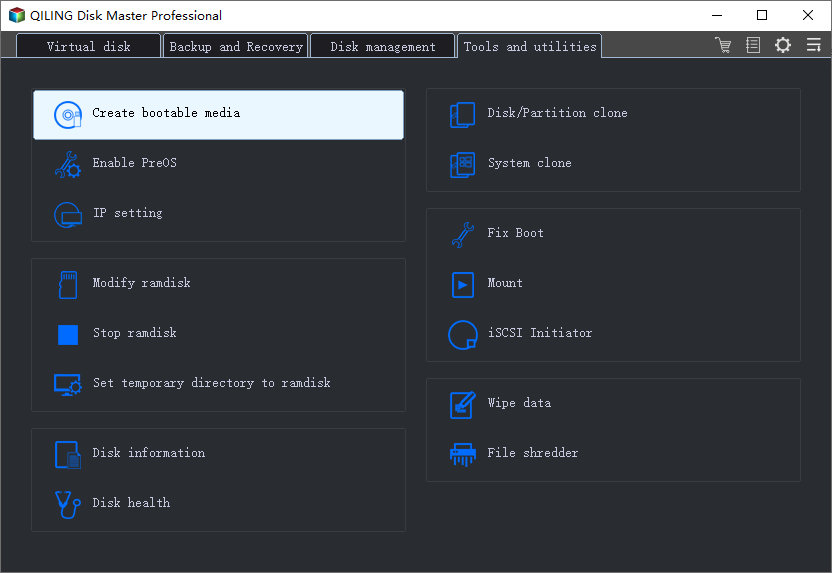
Step 2. Select to create the bootable disk on a USB drive. If your computer has a CD/DVD drive, you can also create the bootable disk to CD/DVD. Click "Proceed" to continue.
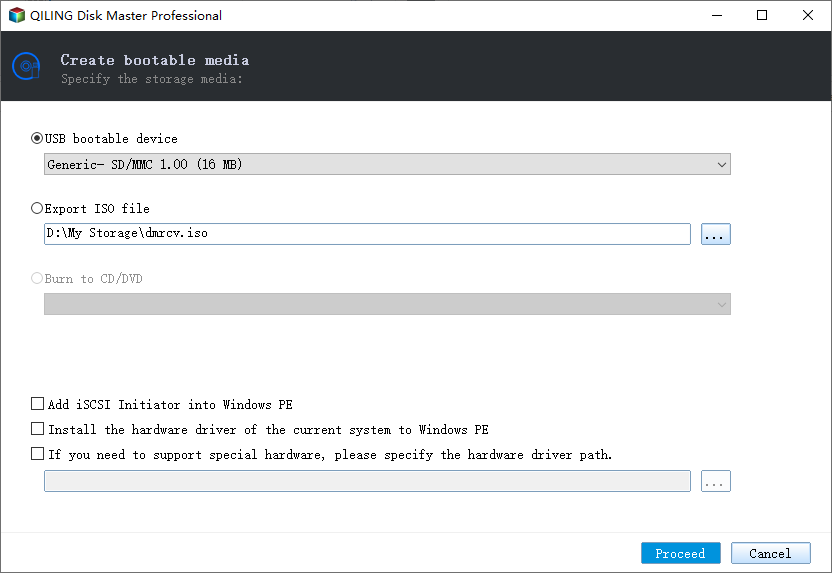
Step 3. Connect the WinPE bootable disk to the computer, restart it and enter BIOS by pressing F2/Del. Set the PC to boot from the removable device or CD-ROM drive before the hard drive, and save changes by pressing F10.
Step 4. After running Qiling Partition Master, click the "Disk management" tab and select the MBR disk you want to convert. Then, click "More..." and choose the option to convert it from MBR to GPT.
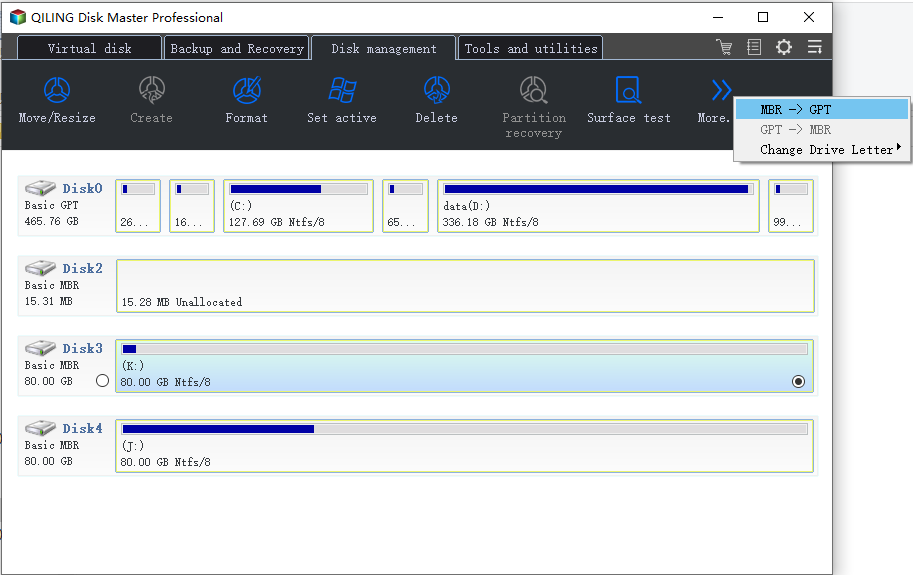
Method 2. Convert MBR to GPT with Disk Management
To convert a disk from MBR to GPT, you can use the Disk Management tool on your computer. This process involves deleting a volume, so make sure to back up your data first. You can then follow the steps in Disk Management to convert the disk type. This method also allows you to delete a volume, extend, or shrink a volume. Please note that this process may require a full backup of your data.
Step 1. Enter Computer Management.
To access Computer Management, go to the Control Panel, select Administrative Tools, and choose "Computer Management". Alternatively, right-click on "This PC" and select "Manage" to open Computer Management.
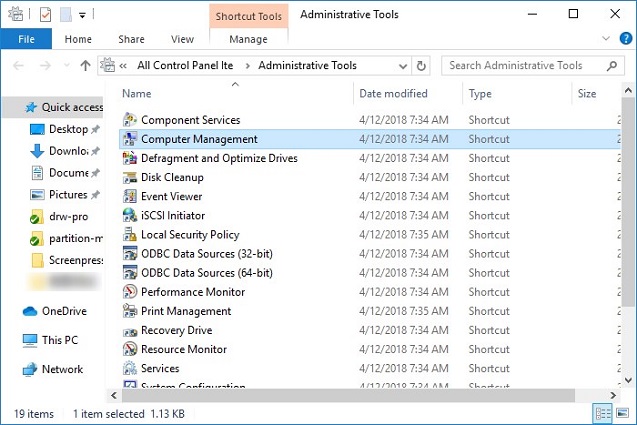
Step 2. Delete the Target MBR Volume.
To delete all disk volumes, go to Disk Management, right-click on each volume and select "Delete Volume" to remove them one by one.
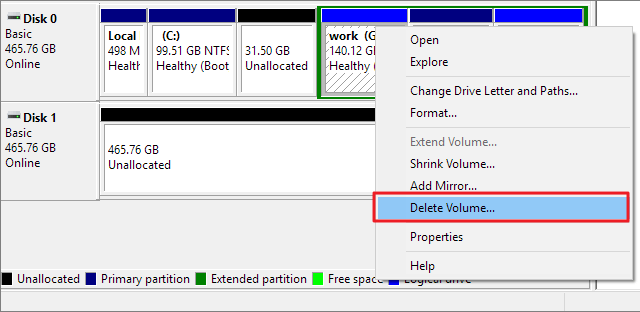
Step 3. Choose Convert to GPT Disk.
To convert a MBR disk to GPT, select the MBR disk and click the "More..." button, then choose the option to "Convert to GPT".
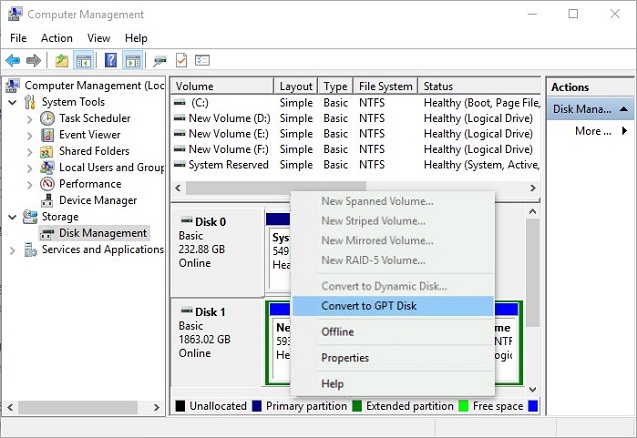
Method 3. Convert MBR to GPT with Diskpart
To convert MBR to GPT, you can install Windows via the installation DVD or USB, which will erase all existing files on the disk, or use Method 1, or back up your files using Qiling Backup and create a bootable device.
Step 1. Turn off the PC and put in the Windows installation DVD or USB.
Step 2. Boot the PC from the DVD or USB.
Step 3. In Windows Setup, press "Shift + F10" to start Command Prompt.
Step 4. Enter the following command in order to convert the MBR disk to GPT:
- diskpart
- list disk
- Select the disk you want to install Windows on, which is typically the drive with the most free space. This is usually Disk 1, but make sure to choose the correct disk to avoid overwriting important files.
- clean
- convert gpt
- exit
Please rephrase the instruction in one paragraph: After running the command, close the Command Prompt and proceed with the Windows installation.
Notice:
On many Windows 10 computers with UEFI firmware that supports BIOS-compatibility, you can switch to BIOS mode to accommodate a Master Boot Record (MBR) disk, allowing for booting in a traditional BIOS-like environment.
Cause of 'The Selected Disk Has an MBR Partition Table'
The error message indicates that Windows cannot be installed on an MBR disk because the computer has an EFI system, which is not compatible with MBR disks. This is because the computer's hardware doesn't allow booting from a disk with the MBR partition table, making it impossible to install Windows on an MBR disk on an EFI system.
What is an MBR Partition Table
The partition table, which determines the layout of a hard drive, such as an HDD or SSD, tells Windows how to access the data on it. The traditional MBR (Master Boot Record) partition table has limitations, supporting disks with a maximum size of 2TB and only allowing up to four primary partitions on the MBR disk.
The GPT partition table is a newer standard for disk partitioning that supports larger disks and has no theoretical limit on the number of partitions.
MBR and GPT are two common partition styles used on computers. They serve the same purpose but have different methods of managing disk space, with MBR being the older and more traditional method, and GPT being the newer and more advanced method, offering improved reliability and flexibility.
What is EFI
Most computers use either BIOS or UEFI (Unified Extensible Firmware Interface) as their boot mode. UEFI, which stands for Extensible Firmware Interface, refers to the partition that stores the boot files for UEFI.
Why Cannot Windows Be Installed to the MBR Disk
Computers with traditional BIOS firmware should install Windows on MBR disks, while those with UEFI firmware should install Windows on GPT disks.
You're trying to install Windows on a computer with UEFI firmware, but the disk you're trying to install it on has a Master Boot Record (MBR) partition table, which is not compatible with UEFI firmware, resulting in the error message.
The Bottom Line
To solve the 'Windows cannot be installed to this disk MBR' issue, you can change the Master Boot Record (MBR) to a GUID Partition Table (GPT) using a partition tool like Qiling Partition Master or the Windows installation DVD/USB, depending on whether you want to keep the files on the MBR disk. This should successfully resolve the problem.
Related Questions
There are several hot issues related to MBR disks that might interest you, but unfortunately, I'm not aware of any specific text to draw from. If you could provide more context or clarify what you're looking for, I'd be happy to try and assist you.
"How do I change MBR to GPT?"
If your computer can boot properly, you can change the Master Boot Record (MBR) to GUID Partition Table (GPT) using Disk Management. If it can't boot, use Qiling Partition Master or Windows installation media to convert MBR to GPT.
"How do I get rid of the MBR partition table?"
The partition table is necessary to use a disk, so you can't simply get rid of the MBR partition style. To avoid it, you should convert to GPT instead.
"Can Windows 10 installed on MBR partition?"
Whether you can install Windows on a Master Boot Record (MBR) depends on the firmware of the computer. Windows 10 can be installed on an MBR partition if the computer is BIOS-based or UEFI-based with BIOS-compatibility.
"Can Windows 11 be installed on MBR disk?"
Windows 11 requires secure boot mode, which only works on UEFI boot mode, and UEFI boot requires a GPT disk type, so you'll need to convert the OS drive to GPT before installing or upgrading to Windows 11.
Related Articles
- Fix Diskpart Clean Not Working on Disk/USB/SD Card [5+ Fixes]
- How to Convert GPT to MBR (Without Data Loss) with 3 GPT to MBR Converter
- How to Format SD Card to NTFS on PC and Android
- How to Merge Non-adjacent Partitions in Windows 11/10
- How to Fix Extend Volume Greyed Out in Windows 11?
- How Do I Securely Erase Hard Drive/SSD, Wipe Confidential Data? Your Reliable Guide Is Here